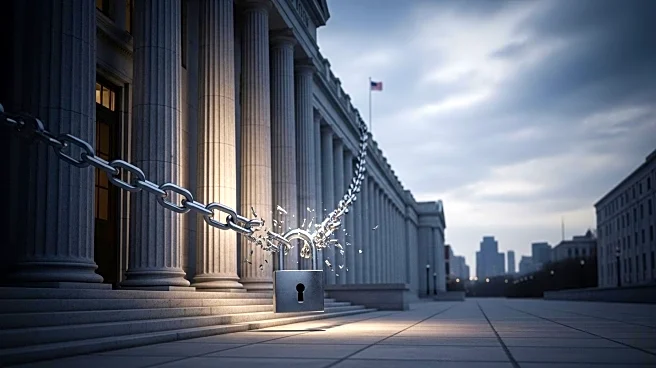What is the story about?
What's Happening?
The federal government shutdown has entered its second week, with no clear resolution in sight. The shutdown has resulted in the suspension of Capitol tours and a halt in legislative activities in the House, while the Senate remains deadlocked over a plan to reopen the government. President Trump has threatened to terminate federal workers and deny them back pay, intensifying the situation. The core issue revolves around health care subsidies, with Democrats demanding their continuation to prevent rising health care costs, while Republicans, who hold the majority in Congress, resist these demands. Behind the scenes, some bipartisan discussions are taking place, with figures like Sen. Susan Collins proposing potential solutions. However, public negotiations have yet to materialize.
Why It's Important?
The ongoing shutdown has significant implications for federal employees, who face missed paychecks, and for the broader U.S. economy, as government services remain disrupted. The dispute over health care subsidies is critical, as it affects millions of Americans who rely on the Affordable Care Act for insurance. The expiration of enhanced subsidies could lead to increased insurance costs, impacting public sentiment and potentially influencing upcoming elections. The shutdown also highlights the deep political divide in Congress, with both parties using the situation to rally their bases ahead of the 2026 midterm elections.
What's Next?
The Senate is expected to attempt another vote on a House-passed bill to fund the government, though it is likely to fail without a resolution on health care subsidies. Both parties are entrenched in their positions, with Democrats focusing on health care messaging and Republicans emphasizing the economic impact of the shutdown. The outcome of these negotiations could set the stage for future legislative battles and influence voter perceptions in the lead-up to the midterm elections.
Beyond the Headlines
The shutdown underscores the ongoing challenges in U.S. health care policy, particularly the contentious nature of the Affordable Care Act. The political maneuvering around the shutdown may have long-term implications for party strategies and voter engagement. Additionally, the potential denial of back pay for federal workers could set a new precedent, affecting future government shutdowns and labor relations.















